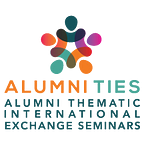Alumni Voices: Strengthening Media Literacy Education and Digital Citizenship in the Western Hemisphere
This March, the Office of Alumni Affairs and TechCamp team at the Bureau of Educational and Cultural Affairs (ECA) of the U.S. Department of State joined forces to implement a virtual seminar for international exchange alumni on “Advancing Digital Citizenship through Media Literacy.” World Learning handled the logistics and technology, and PeaceTech Lab and the National Association for Media Literacy Education (NAMLE) designed the seminar schedule and arranged an impressive slate of speakers and facilitators. Michelle Ciulla Lipkin, Executive Director of NAMLE and an alumna of the U.S. Speaker Program, moderated several of the seminar’s sessions.
Over 40 alumni participants from the United States, Argentina, Bolivia, Brazil, Dominican Republic, Guatemala, Mexico, Peru, St. Kitts and Nevis, Trinidad and Tobago, Uruguay, and Venezuela attended interactive sessions to discuss strategies for countering disinformation, advancing media literacy education, and promoting accountable digital citizenship. Representing over 25 exchange programs and the fields of education, business, journalism, and government, participants brought diverse perspectives, enabling dynamic conversations on the different utilities of media literacy guided by 30 experts in media literacy, design thinking, journalism, project management, and digital literacy.
The first week focused on educating and engaging participants on the complexities of media literacy and its uses across industries, communities, and social situations. Acting ECA Principal Deputy Assistant Secretary Aleisha Woodward kicked-off the seminar program by welcoming participants, sharing her own exchange experiences, and discussing the importance of media literacy education in the Western Hemisphere. During the rest of the week, participants tackled topics ranging from countering COVID-19 disinformation, digital wellness and responsibility, youth influencers and unconscious bias, engaging community stakeholders, mobilizing youth through remote learning, the impact of post-truth on the efficacy of media literacy, and building a civic imagination through collective storytelling. Media literacy experts such as Stephen J. Adler, Editor-in-Chief at Reuters; Roman Gerodimos, Associate Global Professor of Global Current Affairs at Bournemouth University; Paul Mihailidis, Professor of Civic Media and Journalism at Emerson College; Sherri Hope Culver, Director and Associate Professor of the Center for Media and Information Literacy at Temple University; Sangita Shresthova, Director of Research and Programs, Civic Paths Group at the University of Southern California; and many more experts shared their current work on media literacy, data journalism, storytelling, and digital citizenship. Beyond the sessions led by outside experts, alumni participants served on multiple panel discussions and engaged directly with each another to share their expertise with media literacy projects and initiatives in their communities. Moreover, several participants took part in a Virtual Poster Fair for which they submitted digital posters showcasing their existing work or project ideas for Alumni TIES small grant projects.
During the second week, participants applied their newly acquired knowledge to create plans for media literacy projects in their own communities. They spent the week learning about the Alumni TIES small grant opportunity, how to write a grant proposal, how to engage with local stakeholders and partners, and how to craft a compelling story for a project pitch. The virtual seminar included active participation on community discussion boards, one-on-one video calls, and virtual networking tables to connect with one another through the event platform Whova. They also had the opportunity to engage in “deep dives” on topics of interest with seminar speakers and media literacy experts through mentor meetings. The participants and mentors held targeted conversations based on their interests and expertise in areas such as youth engagement, social media analytics, data integration, proposal writing, project management, producing videos for social impact, and fundraising.
On the final day, keynote speaker Shelly Bell, Founder and CEO of Black Girl Ventures, shared her transformative entrepreneurial journey. She emphasized the importance of creating a story for a business idea and ensuring that the story and idea are authentic to the emerging entrepreneur. Inspired by her energy and vibrant story, participants employed this method of storytelling for their final pitch presentations. In teams, participants presented their project ideas to their peers, invited guests, and competition judges. The teams covered a range of topics and ideas, including an online platform to provide media literacy education and support to migrants; media literacy workshops for high school students; teaching media literacy through coding to youth, teaching digital literacy in indigenous communities, and creating a podcast that highlights the stories of survivors of gender-based violence. The presentations encapsulated what the participants learned during the seminar and the relationships they formed with one another to navigate the currents of change in media literacy in their communities.
The Alumni TIES TechCamp Reconnect seminar concluded with a reflection and closing remarks from Deputy Assistant Secretary Stacy White of ECA’s Professional and Cultural Exchanges. In her final remarks, she thanked participants for being active alumni network members, for their continued engagement with the U.S. Embassies and Consulates in their home countries, and for pursuing the important work of media literacy education in their own communities.
What’s Next?
After an informative and memorable seminar, the alumni participants signed off, after forming meaningful connections with their peers and a wealth of new knowledge. One participant commented that the seminar helped her realize “how important some of these [media literacy] concepts are and how urgent it is to bring them into the reality of my community. I intend to deepen my studies in this area and become a media educator.” It was evident from the final reflection session that participants felt connected to one another and eager to collaborate to empower others in their communities to accelerate the development of innovative, technology-supported solutions to strengthen media literacy education.
The Alumni Thematic International Exchange Seminars (Alumni TIES) program is sponsored by the U.S. Department of State with funding provided by the U.S. Government and administered by World Learning.
